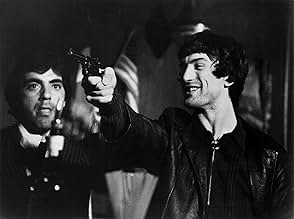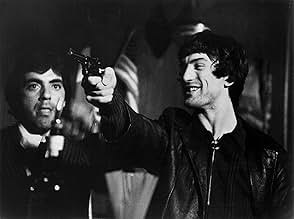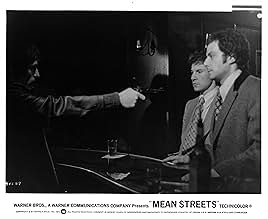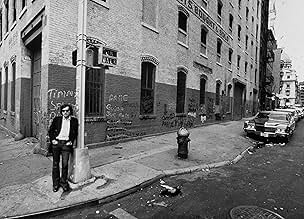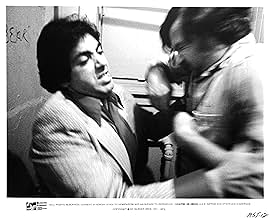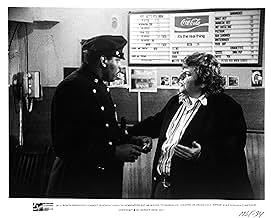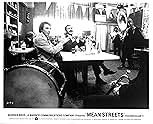Em Little Italy, na cidade de Nova York, um mafioso devoto católico precisa conciliar seu desejo de poder, seus sentimentos por sua namorada epiléptica e sua devoção por seu amigo problemáti... Ler tudoEm Little Italy, na cidade de Nova York, um mafioso devoto católico precisa conciliar seu desejo de poder, seus sentimentos por sua namorada epiléptica e sua devoção por seu amigo problemático.Em Little Italy, na cidade de Nova York, um mafioso devoto católico precisa conciliar seu desejo de poder, seus sentimentos por sua namorada epiléptica e sua devoção por seu amigo problemático.
- Direção
- Roteiristas
- Artistas
- Prêmios
- 5 vitórias e 5 indicações no total
- Mario
- (as Vic Argo, Victor Argo)
- Oscar
- (as Murray Mosten)
Avaliações em destaque
And yet ironically Mean Streets is rarely acknowledged as the masterpiece that it is, perhaps because a number of people actually forget about it. Everyone remembers Taxi Driver, Raging Bull and GoodFellas in particular, but Scorsese's breakthrough remains one of his most important and honest pieces of work, given little recognition apart from the praise by movie critics who do remember it.
Harvey Keitel, giving one of his most realistic and three-dimensional performances of all-time, plays the lonely and worried Charlie, a 20-something New York City Catholic who is haunted by his friend, Johnny Boy (De Niro), the local loner who has to jump off the sides of streets in order to dodge the local Mafia thugs he owes money to.
Mean Streets has been accused of lacking a point, and one critic calls it 'too real,' but I'd take this over most recent films any day of the week. Mean Streets doesn't have a dynamic arc like most motion pictures do sure, there's the rising action leading up to the climax, but it doesn't move from one frame to another trying to figure out the easiest way to end the movie while managing to stress all its points in such a manner so blatant that a four-year-old could pick up the themes.
It respects its audience enough to study its characters in such a way that they are given ten times as much depth as those seen in modern films released through Hollywood. As Johnny Boy, De Niro paints the ultimate portrait of a typical street loner a dumb kid who 'borrows money from everyone and never pays them back.' Charlie, much smarter and wiser, takes Johnny under his wing and tries to help him get a job, so that he can pay back what he owes to a local kingpin. However, Johnny is so irresponsible and stupid that he doesn't show up for work and begins fighting with the mob leading up to an inescapable conclusion that features some very ancient themes colliding together. It's the classic tale of redemption and escaping one's past, and if the film has a point it is that some people can't change and you'll get what's coming to you, even if you've got other people helping you out.
The film does have its technical flaws, such as poor dubbing, inconsistency, and the occasional goof. It's a raw movie, filmed on a low budget by a young and far more naïve Martin Scorsese. But all his typical elements are in place, to be expanded upon later in his career.
Keitel and De Niro are superb, particularly De Niro who shows great range very early on in his career. Almost unrecognizable in shabby clothing, hats and a scrawny figure to boot, this is a role that would typically be more suitable for Christopher Walken or other charismatic character actors but De Niro pulls off the role with intense talent, proving once again that he can handle any type of role. He's known for his psychotic roles, but in Mean Streets, he plays the opposite of Travis Bickle. Johnny Boy isn't unstable or psychopathic he's just wild and stupid.
Keitel channels all the thoughtful consciousness of an older child, considering Johnny Boy to be a brother of sorts. He feels that if he fails Johnny, he will somehow fail himself.
Mean Streets is a careful character study that never resorts to cardboard cutout caricatures or the standard clichés of the genre. Dialogue does not exist to move action forward towards the next adrenaline-packed sequence; Mean Streets focuses on its inhabitants with such strong emotional power that it's impossible not to be caught up in its grasp. A true classic from start to finish, and undeniably a very moving film.
It has been years since I saw this film and I noticed that I had last watched it before I started reviewing. As a result I watched it again yesterday to refresh my memory. Seeing it with older eyes is an impressive experience because I appreciate what Scorsese has gone on to do and found it fascinating to look back on this, one of his earliest films. The plot is a mash of characters and events that come together to create a sense of place that is convincingly done; the overall narrative focuses on Charlie, in particular where his relationships are taking him but this aspect ebbs and flows with the events. It is funny, violent, personal and engaging, only a few aspects come over as weak. The script flows like real dialogue, producing the different moods of each scene and also being memorable and rough.
The style and direction of the film are impressive and it is interesting to see the influence Scorsese had with this and his other films. The techniques employed here will ring bells with anyone who watches modern cinema and television with more than a passing interest, Sopranos in particular owes him a debt. Here we have the slow-motions, chest-mounted camera (I'm sure there is a proper name for it), impressive use of music and so on that we have come to be used to with Scorsese and one cannot help be impressed by how well developed these ideas were at an early stage in his career. Of course along with stylistic constants, several of the cast would become regulars. Keitel is the heart of the film for me and, although his opportunities in the script are surprisingly limited, I felt he did well with the themes handed to him. De Niro of course catches the eye more because of what was to come but also because he has the more energetic character. Robinson didn't make much of an impression on me but the support cast features early turns from faces such as Proval, Romanus, Argo and others.
Mean Streets might be a bit rough and ready when placed next to the polished films that Scorsese would go on to do but it does not take away from its strengths to look back at it. So much of Scorsese's style and calling cards are in place even at this early stage and his film convincingly creates the streets and characters of the place. The main players involved have done better films since this one but it is still strong, stylish and interesting and definitely worth a look for anyone who has since any other Scorsese films.
One thing to immediately note about 'Mean Streets' is the performance of our two leads, Harvey Keitel and Robert De Niro, both looking young and are full of energy. They deliver the goods, big time. They are both so watchable and make up at least half of the movie's appeal. In fact, 'Mean Streets' is an inherently watchable movie overall, helped by some fine dialogue and Scorsese's trademark energetic and involving camera-work. The main draw is the antics of the characters and their relationships rather than a high-stakes narrative. Dramatic things happen but don't relate intrinsically to the central plot: that of De Niro's character Johnny Boy, his debts to clubs, bars and old pals along with his long-suffering buddy Charlie (Keitel).
In comparison to other Scorsese films (which is inevitably going to happen if this is not your first Scorsese), it is very low on scale and as mentioned before, low on stakes. This is no gangster epic or psychological portrait but simply a 2 hour window into the streets of New York. It is certainly worth watching.
The film is gritty and shot in a documentary style with several tracking shots being carried out hand held. It takes the film 45 minutes to give you a clear plot and a clear understanding on what going to unfold. The last 20 minutes is directed perfectly with a palpable sense of suspense and is clearly the best ending you can give to this film. One negative would be that in the first half there literally no set pieces . Not a lot happens but saying this you get a clear understanding and fully engaged with the characters which makes the last 20 minutes outstanding.
It not the best film that Scorese has ever made but it clear by watching this that Mean Streets was his main starting point to his successful career
What Scorsese Film Ranks Highest on IMDb?
What Scorsese Film Ranks Highest on IMDb?
Você sabia?
- CuriosidadesFrancis Ford Coppola contributed money to the budget of the film. However, it is rumored that he lent Martin Scorsese $3000 as the Mafia shook him down for using the San Genaro Festival as a backdrop without "permission". It's generally presumed the Mafia uses the all-cash festival to launder money from their ill-gotten gains.
- Erros de gravaçãoYou can see Robert De Niro's mic pack on his back when he gets up to walk to the window at Charlie's house after staying the night.
- Citações
[first lines]
Voice in Charlie's Mind: You don't make up for your sins in church. You do it in the streets. You do it at home. The rest is bullshit, and you know it.
- Versões alternativasNBC edited 10 minutes from this film for its 1977 network television premiere.
- ConexõesEdited into American Cinema: Film Noir (1995)
- Trilhas sonorasJumpin' Jack Flash
Written by Mick Jagger (as M. Jagger), Keith Richards (as K. Richards) (uncredited)
By The Rolling Stones
Courtesy of ABKCO Records
Principais escolhas
- How long is Mean Streets?Fornecido pela Alexa
Detalhes
- Data de lançamento
- País de origem
- Central de atendimento oficial
- Idiomas
- Também conhecido como
- Calles peligrosas
- Locações de filme
- Empresas de produção
- Consulte mais créditos da empresa na IMDbPro
Bilheteria
- Orçamento
- US$ 500.000 (estimativa)
- Faturamento bruto nos EUA e Canadá
- US$ 32.645
- Fim de semana de estreia nos EUA e Canadá
- US$ 32.645
- 15 de mar. de 1998
- Faturamento bruto mundial
- US$ 61.676
- Tempo de duração
- 1 h 52 min(112 min)
- Cor
- Proporção
- 1.85 : 1





